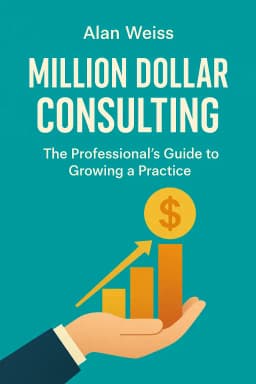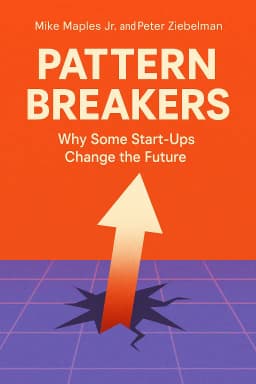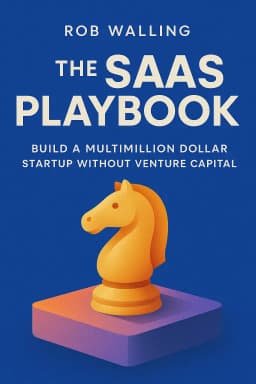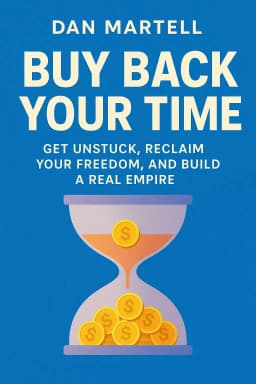
The Panera Paradox
Lessons from a Lifetime of Transformations
Golden Hook & Introduction
SECTION
Mark: Most business advice tells you to chase profits. To focus on the bottom line. Today, we're exploring a philosophy from a CEO who built a multi-billion dollar empire by arguing that profit is the last thing you should focus on. In fact, chasing it directly will kill you. Michelle: That sounds like a fantastic way to go bankrupt. I'm already intrigued. Who is this brave, possibly foolish, CEO? Mark: That's the core argument from Ron Shaich in his book, Know What Matters: Lessons from a Lifetime of Transformations. And he’s got the track record to back up these wild-sounding ideas. Michelle: Oh, I know that name. This isn't just some theorist. This is the guy who founded Panera Bread, basically invented the 'fast-casual' restaurant category, and for two decades, delivered shareholder returns that absolutely crushed competitors like Starbucks and even Warren Buffett’s Berkshire Hathaway. Mark: Exactly. He’s a legend in the industry. But what's fascinating, and what the book reveals, is that his entire business philosophy isn't rooted in some MBA classroom. It's rooted in a deeply personal, almost tragic realization about what it means to live a life without regret. Michelle: A business book that starts with tragedy? Okay, now you really have my attention. Where does this story begin? Mark: It begins with the end. Specifically, the end of his parents' lives.
The 'Future-Back' Compass: Why Your Legacy is a By-Product
SECTION
Mark: Shaich talks about his mother, Pearl, who spent her life in service to her family. When she passed away, she was at peace. She knew she had lived a life aligned with her values. She had done what mattered to her. Michelle: That’s the kind of end we all hope for, right? A sense of peace and completion. Mark: Right. But then he contrasts that with his father, Joseph. He was a charismatic, life-of-the-party kind of guy, but he lived impulsively. When he was dying of cancer, he spent his final year living with Ron, and he was filled with regret. His final assessment of his own life was devastating. He told his son, "I screwed up. And I can’t fix it now." Michelle: Wow. That is absolutely gut-wrenching. To get to the end and feel that... it's a terrifying thought. I can't imagine hearing that from your own father. Mark: It's the ultimate cautionary tale. And for Shaich, it became the foundational lesson of his entire career. He resolved to live his life differently. He developed this concept he calls "living from the future back." Michelle: Okay, 'future-back' sounds a little bit like corporate jargon. What does that actually mean in practice? Is it just about setting long-term goals? Mark: It's more profound than that. It’s about conducting what he calls a 'pre-mortem.' You stand at the end of your life, or the end of a project, and you look back. You ask yourself: "What will have mattered? What will I be proud of? What will I respect?" You define that end-state of self-respect first, and then you work backward to make the choices today that will get you there. Michelle: I think I get it. It’s like trying to achieve happiness. You can't just decide to 'be happy.' Happiness is a by-product of doing other things—building relationships, finding meaningful work, helping others. You focus on the actions, and happiness ensues. Mark: That is the perfect analogy. In fact, he uses that exact idea. He says profit in business is the same. It's a by-product. If you make profit your primary goal, your end, you'll start making bad decisions. You'll cut corners on quality, you'll squeeze your employees, you'll sacrifice the long-term for the short-term. You'll chase the by-product and, in the process, destroy the very things that create it. Michelle: So for a business, what is the 'end' you should be aiming for, if not profit? Mark: Competitive advantage. That’s it. The goal is to build a business that offers something so much better, so different, that customers choose you over everyone else. You focus all your energy—your time, your talent, your treasury—on building that advantage. If you do that successfully, profit is the natural, inevitable result. It's the by-product of being great. Michelle: That makes so much sense. It reframes everything. But it also sounds incredibly difficult. It requires discipline to not just look at the quarterly numbers and panic. Mark: It requires immense discipline. And it requires the courage to do things that look, from the outside, like they make no sense at all. Which brings us to the second part of his philosophy: how you actually build that competitive advantage. His answer is, you have to actively seek out the hard stuff.
The Transformation Engine: Building a Moat with the 'Tough Stuff'
SECTION
Michelle: Okay, 'seek out the hard stuff' sounds like a motivational poster. But in business, aren't you supposed to find efficiencies? Make things easier, cheaper, faster? Why would you deliberately make things harder for yourself? Mark: Because, as Shaich argues, if it's easy, anyone can do it. And if anyone can do it, it's not a competitive advantage. It's a commodity. He learned this lesson over and over, but the most powerful example is Panera's fresh dough. Michelle: I'm listening. I do love their bread. Mark: When Panera was expanding, they had a choice. Shaich's previous company, Au Bon Pain, had already perfected a frozen dough logistics system. It was efficient, cheap, and scalable. The easy, logical business decision was to use that system for Panera. Michelle: Right, that seems like a no-brainer. You already have the technology and the expertise. Mark: But Shaich and his team made a different choice. They decided Panera's core identity, its 'Concept Essence,' was its authority as a bakery. The bread had to be special. So they committed to delivering fresh, never-frozen dough to every single cafe, every single day. Michelle: Hold on. That sounds like a logistical nightmare. You're talking about building a national manufacturing and refrigerated trucking network from scratch, just to deliver fresh dough. That's astronomically more expensive and complex. Mark: It was an absolute nightmare. It took them years and tens of millions of dollars to get it right. They had to build regional dough fabrication facilities all over the country. They had to manage a fleet of trucks on precise schedules. The quality control was a constant battle. His board and investors thought he was insane. Michelle: So why do it? Why choose the path of most resistance? Mark: Because it built a moat around the business. It was so brutally difficult and expensive that no competitor could easily copy it. Starbucks couldn't just wake up one morning and decide to compete on fresh-baked bread. McDonald's couldn't. It created a ten-year head start that was almost impossible to overcome. That 'tough stuff' became the competitive advantage. Michelle: Wow. So the difficulty itself is the strategy. That's a wild concept. It’s not about having a secret recipe; it’s about choosing a process so painful that nobody else is willing to endure it. Mark: Precisely. And he applied this again and again. Later, in the 2010s, he realized that while people loved Panera's food—the desire was high—the experience of getting it was becoming a huge pain. The lines were long, the ordering process was a chaotic 'mosh pit,' and getting takeout was a hassle. The friction was becoming too high. Michelle: I've definitely been in that Panera mosh pit. You want the soup, but you're not sure if you have 20 minutes to fight for it. Mark: Exactly. The desire-friction ratio was out of whack. So he initiated Panera 2.0, a massive, half-a-billion-dollar transformation to digitize the company. This wasn't just about launching an app. It was about re-engineering the entire operational system. They built digital ordering kiosks, mobile apps, and a 'Rapid Pick-Up' system. But crucially, they also had to completely redesign the kitchens to handle the new influx of digital orders without collapsing. Michelle: That sounds like another operational nightmare. You're basically rebuilding the engine of the car while it's speeding down the highway. Mark: It was. And it was another piece of 'tough stuff' that competitors couldn't easily replicate. It took years of investment and pain, but it fundamentally changed the business and solidified their advantage for another decade. He didn't just solve a problem; he solved it in a way that was incredibly hard to copy.
Synthesis & Takeaways
SECTION
Michelle: It’s really a powerful, two-part system when you lay it out like that. First, you use that 'future-back' compass, that pre-mortem, to figure out what truly matters—building a business and a life you can respect. Mark: That’s your North Star. Michelle: Exactly. And once you have that North Star, you build the 'transformation engine' to get there. And the fuel for that engine is a willingness to do the hard, painful, operationally complex things that create a real, lasting, and uncopyable advantage. Mark: And it all comes back to his first, most important rule: Tell the truth. He had to be honest with himself about his father's life to find his own compass. He had to be honest that Panera, his own creation, was becoming a pain to order from, which sparked the Panera 2.0 transformation. That brutal honesty is what fuels the entire engine. Without it, you can't know what matters, and you certainly won't have the courage to do the tough stuff. Michelle: That's so true. It’s easy to lie to yourself and say everything's fine, to take the easy path. The hard path requires confronting an uncomfortable truth first. It really makes you ask yourself a tough question: What's the 'hard thing' in my own work or life that I'm avoiding because it's easier not to? The thing that, if I actually did it, would create real, lasting value? Mark: That's the perfect question to end on. It's what the whole book is about. We'd love to hear your thoughts on this. What's the 'tough stuff' you're inspired to tackle after hearing this? Find us on our socials and join the conversation. We're always curious to hear how these ideas land with you. Michelle: This is Aibrary, signing off.









